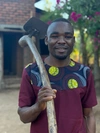Agwu Kalu Ibe
How One Young Nigerian Turned Waste Into a Thriving Business

Agwu Kalu Ibe’s world was changed in an instant.
Like thousands of people in northern Nigeria, Ibe was forced from his home after an insurgent attack. He and his family ended up in an overcrowded displacement camp, where 3,000 people were crammed into a space built for only 250. Urgent needs were prioritized: food, water, medicine, and schooling. Not much attention was given to the growing piles of garbage.
So, he began collecting it himself. It was not long before a few women volunteers joined him, turning a simple act of care into something bigger. Ibe soon realized that waste management was an opportunity that could transform lives. “These women had lost everything,” he says. “I wanted to make the rubbish collection effort worth their while, and something they could be proud of.”
Level Up Recyclers is Born

Ibe moved to the capital Abuja in 2020, where the waste problem was even greater. Drawing on his background in chemistry and his lived experience, he transformed that small camp initiative into a full-fledged waste management company.
Level Up Recyclers now operates a sorting facility and runs eight collection trucks covering 22 routes across Abuja.
In the early days, they had no vehicles, no equipment, and no formal routes - just determination and purpose. “I was the manager, accountant, and everything else,” Ibe recalls.
Today, the thriving company has collected over 3,200 tons of plastic waste, helping to reduce environmental harm and improve public health in the city. It now employs 10 permanent staff, 52 part-time sorters, and over 600 collectors, many of whom still live in displacement camps or informal settlements. Collectors earn a living as they gather waste, creating a circular economy that generates livelihoods while rewarding environmental responsibility.
Level Up Recyclers also works closely with local governments, proving that solutions led by visionary young people can drive both social and environmental change at scale.
Building Beyond Capital
Ibe says the biggest challenge wasn’t funding but a lack of skills. “People always think it’s about money. But if you don’t know how to manage it, all the finances in the world won’t take you far.”
Ibe had completed his university education before his displacement, previously applying for banking jobs and competing with thousands for just a handful of roles. But when conflict displaced him, his work cleaning up the camp changed his journey. It inspired him to strike out on his own, despite the skepticism he faced. “People would say, ‘Who introduced you to this business? It is not for young people. You shouldn’t be here. You do not have what it takes.’”
When he started Level Up Recyclers, Ibe had no formal business training. “I began casually. I had no sense of what it meant to run a company.”
Over time, he took advantage of youth programs that offered entrepreneurship training and helped him transition into structured business. That kind of capacity-building, he says, is often undervalued but critical.
Ibe’s breakthrough came through the Amahoro Coalition Fellowship, a partnership with the Mastercard Foundation’s Refugee and Displaced Persons (RDP) portfolio, which offers training, mentorship, and access to capital to young, displaced entrepreneurs.
But through the Amahoro Fellowship, Ibe gained credibility and has represented Nigeria on international platforms.
“Now when important discussions are being had - like around banning single-use plastics - we are invited to the table. We are part of the conversation,” he says.
Building Relationships
One of Ibe’s biggest lessons has been understanding the importance of business ecosystems: you need to know the sector, its needs, and the key stakeholders. He quickly realized that the most important people were not politicians or industry power brokers, but the waste pickers who power the work. This insight shaped his collaborative approach, which is focused on building knowledge, relationships, and shared ownership.
Belief, he says, is just as critical as funding. “People talk down to youth - they say we are not ready. But if no one opens the door, how will we gain experience? We need platforms that respect young people as problem-solvers.”

Ibe saw early on that youth-led ventures had the competitive advantage of being close to the problem – and often the first to act. He also learned that the rules shaping his sector were not built for enterprises like his.
“We weren’t asking for favours,” he says, “just space to build.” Some days, navigating local regulations felt harder than managing the waste itself. “Government has the power to kill or grow a business,” Ibe adds. “They need to use that power consciously to support young and small enterprises to thrive.”
A Vision of the Future
Ibe did not set out to become an entrepreneur. He just wanted a job. Today, he is building the kind of business he once hoped would hire him.
He is scaling Level Up Recyclers into a fully automated material recovery facility, capable of sorting municipal waste, processing plastic into new products, and helping meet Africa’s growing demand for recycled materials. He believes the business can grow to export products, fulfill corporate recycling commitments, and create jobs.
“We have proven the model works. We have created a sustainable business. Capital support helped us grow faster - acquiring trucks, new machines, and expanding our impact. No matter how profitable you are, you cannot scale a business like this alone.”
From a single dumpsite in Abuja to a continent-wide vision, Ibe is not just collecting plastic - he is building pathways for young people who, like him, were once told to wait their turn.
“I want to create 60 million job opportunities by the time I’m 60,” says the 37-year-old. If I do it before then, I’ll retire. Let my legacy be this: Ibe built businesses that created jobs - across Nigeria and the world.”





